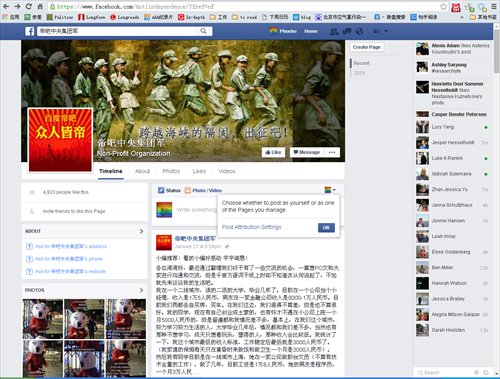
Home page of Di Ba on Facebook
In the past week, an Internet war caught everybody's attention in China. What started out as boycott of Taiwan star Chou Tzu-yu developed into a sticker and emoji battle, led by mainland's biggest online forum and aimed at pro-Taiwan independence media outlets and public figures' accounts on Facebook. While some may regard this as a naive act that won't accomplish anything, it shows how young people choose to express their emotions on social issues and an undercurrent of patriotism.
It was only by accident that Xiang Xiangping came across a message online last Wednesday that declared "Di Ba" will go on a "crusade" again.
The message had a picture attached to it, a map of China against a black background. Written in bold white letters was "Taiwan belongs to my country," and a slogan in red, "When Di Ba goes into battle, nothing will grow."
Her curiosity piqued, she read on.
The 23-year-old from the Chinese mainland but studying in Britain found out that Di Ba, an online forum sponsored by Baidu, China's biggest search engine, was calling for a "crusade" against public figures and media outlets on Facebook that are pro-Taiwan independence, by gathering people to flood these pages with messages.
Recruiting for the campaign had just started, but the events that led up to it had been brewing for days. It started with Taiwan pop star Chou Tzu-yu being attacked for being allegedly pro-Taiwan independence. Netizens across the Straits had argued back and forth on the issue for a couple of weeks, which naturally included lots of vitriol. In the end, users of Di Ba decided to show Taiwan netizens their feelings en masse.
Xiang was shocked after she read the news and immediately decided to join. She always thought there was only a small number of people supporting Taiwan independence, but she found out even some mainstream Taiwan media have written pro-independence articles. Furthermore, she couldn't stand how biased many people in Taiwan seemed to be towards the mainland.
"Most of them described the mainland as a closed-off place with no freedom at all, and we want to show them the real situation and our real thoughts," she said.
Rise of a new culture
The campaign started at 7 pm last Wednesday and was surprisingly well-organized. Participants, using virtual private network software from the Chinese mainland, were separated into different groups and were given various tasks. These included collecting information on which pages to bombard, translating poems and pro-China slogans into different languages, and making graphic stickers. There was a headquarters and administrators of the forum directed the "battle."
Xiang joined a group on Facebook that fought on the "frontline" by posting stickers on targeted home pages. She saw that there were about 30,000 people online in her group at the same time. The most popular stickers included former President Hu Jintao's "eight prides and eight shames," anti-Taiwan independence declarations, as well as photos of food and famous scenery on the mainland.
In an effort to avoid the vulgarity and negativity that usually accompany online discussions, the organizers continually emphasized to their "foot soldiers" that they should avoid cursing and simply post slogans and images of the mainland.
While people who aren't familiar with China's Internet culture might think this "crusade" came out of nowhere, in fact it's in line with the forum's style. Di Ba started out as a fan forum for former Chinese soccer player Li Yi. But in 2005, the forum became a place for fans to make fun of him, when he acted arrogantly in a TV interview.
Gradually, netizens started discussing social issues and news in a sarcastic, mocking manner. Young people go to Di Ba to enjoy its creative content and many popular neologisms in recent years originated in the forum, such as diaosi (loser) and gaofushuai (tall, rich and handsome man).
As of now, Di Ba has more than 20 million registered users and there are over 80 million posts, and both numbers are increasing rapidly. In a country where the number of netizens is close to 700 million, Di Ba is without a doubt one of the biggest online communities.
Because of the time difference, Xiang came to the "battle" later than her peers at home. By the time she opened up Facebook, many pages had already fallen.
Through their sheer numbers, Di Ba users were able to exercise real power over the discussion. Within an hour, two pro-Taiwan independence media outlets, Apple Daily and setn.com had to close down their comment sections.
The act was criticized by some commentators across the Straits. Many called the young people unreasonable, hot-tempered and immature.
Some well-known Weibo bloggers, or Big V's, commented that such acts will only repel people in Taiwan and push them further away.


















































